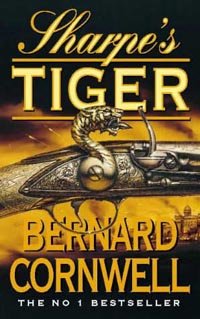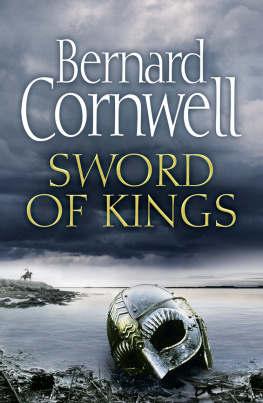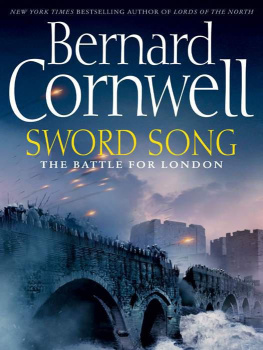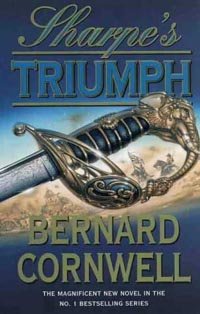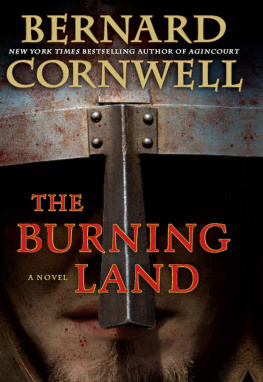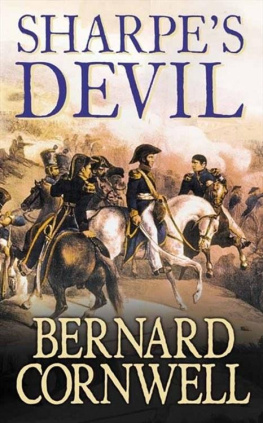Bernard Cornwell
Sharpe's Tiger
Sharpe's Tiger is for Muir Sutherland and Malcolm Craddock, with many thanks
It was funny, Richard Sharpe thought, that there were no vultures in England. None that he had seen, anyway. Ugly things they were. Rats with wings.
He thought about vultures a lot, and he had a lot of time to think because he was a soldier, a private, and so the army insisted on doing a lot of his thinking for him. The army decided when he woke up, when he slept, when he ate, when he marched, and when he was to sit about doing nothing and that was what he did most of the time nothing. Hurry up and do nothing, that was the army's way of doing things, and he was fed up with it. He was bored and thinking of running.
Him and Mary. Run away. Desert. He was thinking about it now, and it was an odd thing to worry about right now because the army was about to give Richard Sharpe his first proper battle. He had been in one fight, but that was five years ago and it had been a messy, confused business in fog, and no one had known why the 33rd Regiment was in Flanders or what they were supposed to be doing there, and in the end they had done nothing except fire some shots at the mist-shrouded French and the whole thing had been over almost before young Richard Sharpe had known it had begun. He had seen a couple of men killed. He remembered Sergeant Hawthorne's death best because the Sergeant had been hit by a musket ball that drove a rib clean out of his red coat. There was hardly a drop of blood to be seen, just the white rib sticking out of the faded red cloth. 'You could hang your hat on that,' Hawthorne had said in a tone of wonder, then he had sobbed, and after that he had choked up blood and collapsed. Sharpe had gone on loading and firing, and then, just as he was beginning to enjoy himself, the battalion had marched away and sailed back to England. Some battle.
Now he was in India. He did not know why he was invading Mysore and nor did he particularly care. King George III wanted Richard Sharpe to be in India, so in India Richard Sharpe was, but Richard Sharpe had now become bored with the King's service. He was young and he reckoned life had more to offer than hurrying up and doing nothing. There was money to be made. He was not sure how to make money, except by thieving, but he did know that he was bored and that he could do better than stay on the bottom of the dung heap. That was where he was, he kept telling himself, the bottom of a dung heap and everyone knew what was piled on top of a dung heap. Better to run, he told himself. All that was needed to get ahead in the world was a bit of sense and the ability to kick a bastard faster than the bastard could kick you, and Richard Sharpe reckoned he had those talents right enough.
Though where to run in India? Half the natives seemed to be in British pay and those would turn you in for a handful of tin pice, and the pice was only worth a farthing, and the other Indians were all fighting against the British, or readying to fight them, and if he ran to them he would just be forced to serve in their armies. He would fetch more pay in a native army, probably far more than the tuppence a day Sharpe got now after stoppages, but why change one uniform for another? No, he would have to run to some place where the army would never find him, or else it would be the firing squad on some hot morning. A blast of musket shots, a scrape in the red earth for a grave, and next day the rats with wings would be yanking the guts out of your belly like a bunch of blackbirds tugging worms out of a lawn.
That was why he was thinking about vultures. He was thinking that he wanted to run, but that he did not want to feed the vultures. Do not get caught. Rule number one in the army, and the only rule that mattered. Because if you got caught the bastards would flog you to death or else reorganize your ribs with musket balls, and either way the vultures got fat.
The vultures were always there, sometimes circling on long wings that tilted to the sudden winds of the warm upper air and sometimes standing hunched on branches. They fed on death and a marching army gave them a glutton's diet, and now, in this last year of the eighteenth century, two allied armies were crossing this hot fertile plain in southern India. One was a British army and the other belonged to a British ally, the Nizam of Hyderabad, and both armies provided a feast of vulture fodder. Horses died, oxen died, camels died, even two of the elephants that had seemed so indestructible had died, and then the people died. The twin armies had a tail ten times longer than themselves: a great sprawl of camp followers, merchants, herders, whores, wives, and children, and among all of those people, as it did among the armies themselves, the plagues ran riot. Men died with bloody dysentery, or shaking with a fever or choking on their own vomit. They died struggling for breath or drenched in sweat or raving like mad things or with skins blistered raw. Men, women and children all died, and whether they were buried or burned it did not matter because, in the end, the vultures fed on them anyway, for there was never enough time nor sufficient timber to make a proper funeral pyre and so the vultures would rip the half-cooked flesh off the scorched bones, and if the bodies were buried then no amount of stones heaped on the soil would stop the scavenging beasts from digging up the swollen, rotting flesh and the vultures' hooked beaks took what the ravenous teeth left behind.
And this hot March day promised food in abundance and the vultures seemed to sense it for, as the early afternoon passed, more and more birds joined the spiring column of wings that circled above the marching men. The birds did not flap their wings, but simply soared in the warm air as they glided, tilted, slid and waited, always waited, as if they knew that death's succulence would fill their gullets soon enough.
'Ugly bastard birds,' Sharpe said, 'just rats with wings,' but no one in the 33rd's Light Company answered him. No one had the breath to answer him. The air was choking from the dust kicked up by the men ahead so that the rearward ranks stumbled through a warm, gritty mix that parched their throats and stung their eyes. Most of the men were not even aware of the vultures, while others were so weary that they had not even noticed the troop of cavalry that had suddenly appeared a half-mile to the north. The horsemen trotted beside a grove of trees that were bright with red blossom, then accelerated away. Their drawn sabres flashed reflected sunlight as they wheeled away from the infantrymen, but then, as inexplicably as they had hurried and swerved away, they suddenly stopped. Sharpe noticed them. British cavalry, they were. The fancy boys come to see how proper soldiers fought.
Ahead, from the low rise of land where a second group of horsemen was silhouetted against the furnace whiteness of the sky, a gun fired. The crack of the cannon was immense, a billow of sound that punched hollow and malignant across the plain. The gun's smoke billowed white as the heavy ball thrashed into some bushes, tore leaves and blossoms to tatters, struck dust from the baked ground, then ran on in ever-decreasing bounces to lodge against a gnarled fallen tree from which a pale shower of decaying wood spurted. The shot had missed the red-coated infantry by a good two hundred paces, but the sound of the cannon woke up the weary. 'Jesus!' a voice in the rear file said. 'What was that?'
'A bleeding camel farted, what the hell do you think it was?' a corporal answered.
'It was a bloody awful shot,' Sharpe said. 'My mother could lay a gun better than that.'
'I didn't think you had a mother,' Private Garrard said.
'Everyone's got a mother, Tom.'
'Not Sergeant Hakeswill,' Garrard said, then spat a mix of dust and spittle. The column of men had momentarily halted, not because of any orders, but rather because the cannon shot had unnerved the officer leading the front company who was no longer sure exactly where he was supposed to lead the battalion. 'Hakeswill wasn't born of a mother,' Garrard said vehemently. He took off his shako and used his sleeve to wipe the dust and sweat from his face. The woollen sleeve left a faint trace of red dye on his forehead. 'Hakeswill was spawned of the devil,' Garrard said, jamming the shako back on his white-powdered hair.

